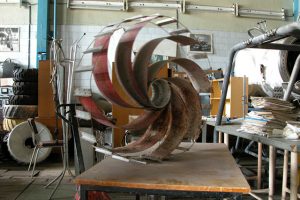Venusian Volcanism
Astronomer Jean-Loup Bertaux on volcanoes, sulfuric lava, and methods to explore the surface of Venus
The video is a part of the project British Scientists produced in collaboration between Serious Science and the British Council.
Ancient Greek and Roman science – when we speak about them we normally use the word ‘science’, even though some people would complain that it’s a bit anachronistic that we are using a term that isn’t really appropriate for the period, but it’s probably the best one we have, because when we use the word ‘science’, I think that we’re referring to our attempts to explain and understand the natural world. I would distinguish science from technology. I think that technology is talking about our attempts to control the natural world. I think an interesting example that it’s sometimes difficult to know whether it’s science or technology in ancient Greece is that of medicine, because we know that some of the ancient Greek physicians were very interested in understanding health and disease, not only in controlling it. When I talk about ancient Greek and Roman science, I’m talking about attempts to explain and understand the natural world, which would include what things are made of, how the world began – if it did begin – or how it has always been here, animals – are they different from humans, and what characteristics they might share, to understand plants; all different aspects of the natural world.
The modern English word ‘science’ is related to the Latin word ‘scientia’, the ancient Greek word for knowledge was ‘episteme’. Probably neither word is exactly carrying the meaning of our modern word ‘science’, and we use the word ‘science as a shorthand of referring to attempts to explain and understand nature. The word ‘technology’ has a rather different meaning – I think that it refers to our attempts to control nature, rather than understand it. Sometimes we can control it or attempt to control it without understanding, sometimes we can understand nature, but not control it.
How do we know what the ancient Greeks and Romans thought about the natural world?
One of our best ways of accessing their ideas are through the writings that they left. But we are also fortunate to have some artifacts that survive, and also descriptions of artifacts. We know for instance that there were scientific instruments, for example, astronomical instruments that were devised and used. Hundreds of sundials actually survive from ancient Greece and Rome. We know also from their records that they made many observations of the natural world; we also have accounts of various sorts of experiments that were carried out. Aristotle is one of the ancient philosophers who tells us about the experiments that he ran.
I think one of the challenges for understanding and studying the science of the ancient Greek and Roman world is to have a very wide view of what it is that we are meant to be studying. I think that we have in the past tended to focus on the great names of ancient science – much as we focused on the great names of more modern science – and we focused for instance on the works of Aristotle, Galen, Ptolemy, and sometimes we’ve neglected works that may seem to be of lesser importance. But just as today science is not only done by people who are going to win a Nobel prize, so too in antiquity – it wasn’t only the great figures like Archimedes, who did maths, but also many anonymous people whose names we don’t know but who seem to have been responsible for some of the ancient mathematical problems that actually survive. We also have texts whose author we don’t know – I think of a poem that’s referred to as the Etna poem, that talks about the volcano Etna. We don’t know wrote it. It’s a work that’s very interesting and tells us a good deal about at least one person’s theories and ideas about volcanoes. Even though we don’t know who wrote it it’s still well worth studying. One of our challenges, therefore, is to really open our eyes and embrace that there is a much wider range of technical and scientific literature out there that we haven’t yet explored. And of course, we are always hoping that we are going to discover another text – that sometimes happens – or discover a new artifact and that there will be something completely new to give us a new window onto the ancient Greek and Roman science.
Our access to ancient knowledge about the natural world is primarily but not only through the written texts. It’s very interesting that there are some very important texts. I think for instance of Plato’s Timaeus that talks about the creation of the world and talks about the mathematical structure of the world – some of it is couched in what might be regarded as somewhat mythological terms and yet it is a very technical text, and certainly it was very important historically in terms of informing later scientific and mathematical conceptions of the world. This is a text that, very surprisingly, is not often read. There are other works by Aristotle – I think for instance of his meteorology, that’s a work that very few people who work on Aristotle’s philosophy have actually read. So I think that there is quite a bit of material out there that we need to explore and we need to engage with more closely. So I think that as in many other fields of study we tend to go down certain paths that have already been well-trodden and I think that we need to branch out and read more texts.

Astronomer Jean-Loup Bertaux on volcanoes, sulfuric lava, and methods to explore the surface of Venus

Cloud Technology Researcher José Luis Vázquez-Poletti on designing technology to explore the Moon

Neuroscientist Diana Omigie on tuning systems in different cultures, congenital amusia and aspects that influe...